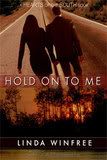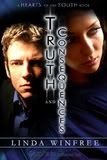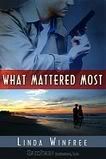Mystery vs. Suspense
There's been some discussion about mystery vs. suspense lately. I noticed a thread on the RWC list after one of my crit partners and I discussed the same phenomenon.
Here's my ground-breaking realization: suspense is one hell of a lot harder to write than mystery.
Yes, I see you rolling your eyes. Jeez, how long has she been writing? Why did it take her so long to figure that out? Where the hell has she been?
I've been writing romantic mystery...evidently. Because now I'm writing romantic suspense, and--crap--it's really hard!
HIDING (my third ms and my first submitted to publishers) is clearly a mystery. There is a serial murder out there (yawn, I know, not particularly original, but give me a break, I wrote it two years ago) and the reader has to figure out who the killer is and why he's killing. Even when a reader *thinks* they know, a good mystery keeps them reading so they can prove to themselves they were right.
But, SAFE (my forth ms and the next slotted to be submitted to publishers) is a whole different animal. In this manuscript, the reader knows who the bad guy is up front. They know his tendencies, his weaknesses, his strengths, how he's related to the hero and heroine. If you include the villain's POV, as I do, the reader even knows the villain's thoughts and plans.
 Now, where the heck is the suspense in that?
Now, where the heck is the suspense in that?
Good question.
If you're not hiding the identity of your villain or your victim or someone else vitally important to the plot, if you don't have murders or clues or red herrings to create an intrisic sense of tension and suspense, how do you do it?
In SAFE, I've given my villain a psychopathic personality with impulse control issues. That way, his personality disorder escalates with the plot events. The reader (I hope) is left wondering--What's he gonna try next? When's he gonna blow? How's it going to happen? How are the hero and heroine going to handle it?
I've also given my hero a solid goal with motivation attached securely to his identity, which keeps him from grabbing the heroine and booking it out of town when things start to crumble. How is he going to keep this mission from falling apart? What's he going do to protect the heroine? How's he going to defeat this villain? Will he end up sacrificing his mission and/or his own life to maintain professional integrity and/or prove personal devotion?
And I've thrown in a heroine who's got scads of personal issues including a need for control, a long-standing hatred for the villain, a lot to gain by the villain's defeat. She also has personality traits that directly clash with the villain, and uses them to get under his skin, making the situation worse.
I suppose my theory for creating the same page-turning suspense you would typically get in a mystery from the **lack of information**, is to offer **lots of information** that purposely creates conflict between the characters and within the plot. Hopefully this results in a continuous flow of story questions and keeps the reader reading.
What are your thoughts and theories on writing mystery vs. suspense?
Here's my ground-breaking realization: suspense is one hell of a lot harder to write than mystery.
Yes, I see you rolling your eyes. Jeez, how long has she been writing? Why did it take her so long to figure that out? Where the hell has she been?
I've been writing romantic mystery...evidently. Because now I'm writing romantic suspense, and--crap--it's really hard!
HIDING (my third ms and my first submitted to publishers) is clearly a mystery. There is a serial murder out there (yawn, I know, not particularly original, but give me a break, I wrote it two years ago) and the reader has to figure out who the killer is and why he's killing. Even when a reader *thinks* they know, a good mystery keeps them reading so they can prove to themselves they were right.
But, SAFE (my forth ms and the next slotted to be submitted to publishers) is a whole different animal. In this manuscript, the reader knows who the bad guy is up front. They know his tendencies, his weaknesses, his strengths, how he's related to the hero and heroine. If you include the villain's POV, as I do, the reader even knows the villain's thoughts and plans.
 Now, where the heck is the suspense in that?
Now, where the heck is the suspense in that?Good question.
If you're not hiding the identity of your villain or your victim or someone else vitally important to the plot, if you don't have murders or clues or red herrings to create an intrisic sense of tension and suspense, how do you do it?
In SAFE, I've given my villain a psychopathic personality with impulse control issues. That way, his personality disorder escalates with the plot events. The reader (I hope) is left wondering--What's he gonna try next? When's he gonna blow? How's it going to happen? How are the hero and heroine going to handle it?
I've also given my hero a solid goal with motivation attached securely to his identity, which keeps him from grabbing the heroine and booking it out of town when things start to crumble. How is he going to keep this mission from falling apart? What's he going do to protect the heroine? How's he going to defeat this villain? Will he end up sacrificing his mission and/or his own life to maintain professional integrity and/or prove personal devotion?
And I've thrown in a heroine who's got scads of personal issues including a need for control, a long-standing hatred for the villain, a lot to gain by the villain's defeat. She also has personality traits that directly clash with the villain, and uses them to get under his skin, making the situation worse.
I suppose my theory for creating the same page-turning suspense you would typically get in a mystery from the **lack of information**, is to offer **lots of information** that purposely creates conflict between the characters and within the plot. Hopefully this results in a continuous flow of story questions and keeps the reader reading.
What are your thoughts and theories on writing mystery vs. suspense?







4Comments:
Joan,
I had to laugh. I was just getting ready to blog about this very thing. lol
Personally, I think suspense is much more interesting and scary than mysteries. I love suspense, but mysteries have never interested me. For me it has to do with characterization. I want to know why villians do the things they do. I want to see in their mind. I want to know them. Abnormality fascinates me. If you make a villain real to me, he becomes much more terrifying.
If he isn't real, if he's just a shadow, I don't feel any connection to him or his plans/kills. It's the same sense of distance as saying getting hit by a car. You know it can happen--that it probably will happen, but it simply doesn't inspire fear.
When a writer gets into a villian though, and lets me see what he's capable of, lets me see what he's got planned--well then it becomes real.
If we, as the reader, know things the hero/heroine don't know. Things that put them in direct danger. It becomes even more suspenseful.
For example-- we know what your villian is capable of. We know just how evil he is. But your heroine doesn't. So we know the kind of danger her actions are putting her in. Same with your hero. We know things about him that your heroine and villian don't know. Things that really adds to the danger.
That's the key I think. Adding to the danger. But in a way so that the reader knows about it, but the characters themselves are blind to it. We can see the coming collision, but can't.
T,
Great points about readers knowing things other characters don't and how that adds to the tension. I definitely haven't played that up enough in SAFE.
Damn, I'm never going to get these revisions done if I keep going back over it, but these are the type of things you can't just skim over and think "It's good enough", you know?
Sigh. Anyway, thanks for the input!
Well then we're even. LOL
I've been thinking about your statement concerning your heroine's personality and how her actions are in direct conflict with the villian's personality and add to the situation crumbling. When you can tie personality/internal needs/motivations with the external plot, it always adds to the tension.
It adds a whole new layer of suspense. It's something I've been aware off, but not really aware of--if that makes sense.
The book I'm marketing doesn't take advantage of that kind of set up at all. Not to the extent it should/could have. So I've been trying to figure out if there is a way to beef that up with in the story sturcture I have.
The new WIP-- interestingly, does exactly this. This whole dual conflict is in the initial set up. Yet this book isn't really heavy on suspense. . .
See, I'm the opposite. I've done both, and I think suspense is easier. Maybe because I find it easier to write from the villain's POV when you know the villain inside and out. For me, mystery is harder because you're trying to keep the villain's identity a secret, but you still try to incorporate villain POV scenes - or victim scenes - that give enough depth to the villain without revealing too much. Am I leaving enough red herrings? Is this totally obvious? Is my villain deep enough? Those aren't problems for me when I'm writing a true suspense.
Post a Comment
<< Home